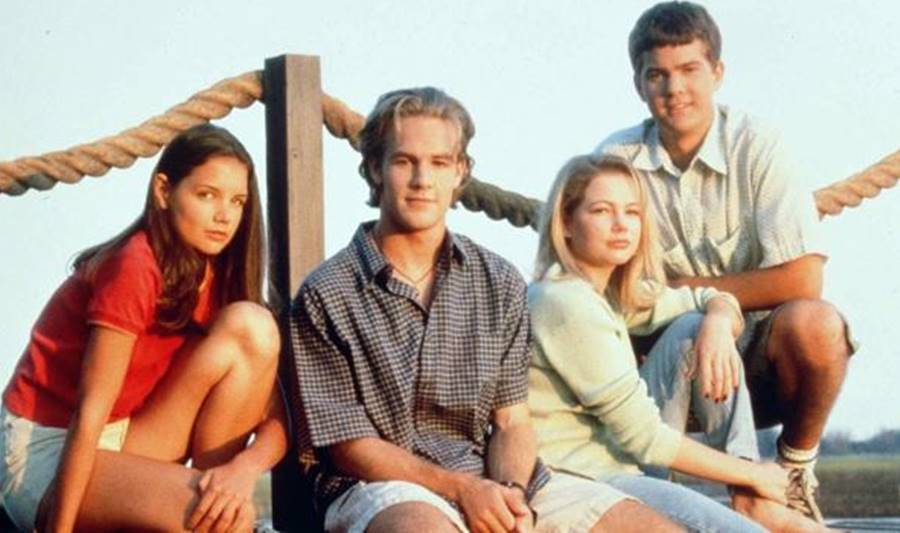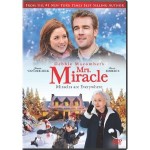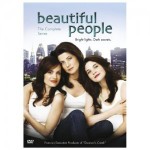
By Jae-Ha Kim
Chicago Sun-Times
February 12, 1999
Enticing a young man to do her a favor, a TV vixen seductively promises, “I’l let you touch me in bad places.”
The favor? Videotaping her high school class assignment. The TV show? “Dawson’s Creek,” which airs at 7 p.m. Wednesday on WGN-Channel 9.
Lines such as that, coupled with an attractive cast that includes “Varsity Blues” star James Van Der Beek and current “It” girl Katie Holmes, have made the teenage drama a must-see show for 12- to 17-year-olds.
Ultimately, “Dawson’s Creek” is no more shocking than a soap opera or the defunct boomers targeted “thirtysomething.” In fact, a survey addressing sex on television released Tuesday by the Henry J. Kaiser Family Foundation, found that there was sexual content in 56 percent of all TV shows. The difference here is that the actors all in their late teens and early 20s are portraying students rather than adults vamping it up in the corrupt working world.
None of the actors on the show has achieved the kind of popularity that catapulted Leonardo DiCaprio to titanic celebrity last year. But the relatively low-rated series – it finished 86th last week, fifth in its time slot – has a strong enough following to launch film careers for the four main characters.
“I’d say that about 80 percent of the girls in my classes are addicted to `Dawson’s Creek,’ ” said Tanya Lim, 17, a senior at Chicago’s Latin School. “It has a huge cult following. The reason I watch is because I’m drawn to the characters’ problems, which are much more dramatic than my own.”
Katie Minor, 13, of Norridge, has been an avid fan since day one. She likes the show, she said, because it reveals “how teens are today.”
So her classmates talk nonstop about sex?
“No,” said Katie, an eighth-grader at Chicago’s St. Eugene School. “Kids don’t really talk about (sex) in school. We talk about boys. Maybe they do in high school, but not in eighth grade. But you have to face it sometime.”
“Dawson’s Creek” shows “a variety of different things on how teens deal with their problems, and what they have to go through with their friends and family,” Katie said. “And we really relate to all that.”
Which is the point “Dawson” producers are making.
“We’re trying to show an honest depiction of what kids face, and what teen life is like,” said executive producer Paul Stupin.
Media experts such as Robert Thompson believe the timing is right for a show about teens that doesn’t talk down to its audience.
“People think that teen shows are just for teen viewers,” said Thompson, founding director of the Center for the Study of Popular Television at Syracuse University. “But cop shows aren’t just for cops, just like doctor shows aren’t just for doctors.
“Between `Party of Five,’ `Dawson’s Creek’ and (the canceled) `My So-Called Life,’ American TV (programmers) have finally discovered that the lives of teenagers make for good television literature.”
Make that sometimes racy television literature. Before each “Dawson’s” episode airs, a discretionary warning pops up stating that the program deals with subject matter not suitable for pre-teens.
To some watchdog organizations, that isn’t enough especially for a show so popular with children.
“This is a program that shows kids behaving in an irresponsible manner,” said Mark Honig, executive director of the Parents Television Council. “Last season, you had the illegal relationship between the teacher and the 15-year-old male student.
And this season, you had parents engaging in what they called an `open marriage.’
“These are very dysfunctional kids who speak as if they’re Harvard graduates. They don’t talk like teenagers, and they behave in ways that most parents would not want their kids to emulate.”
But as often as the characters deconstruct the concept of sex and relationships with dialogue that is unrealistically sophisticated, the show also conveys the awkward uncertainty of what it’s like being at an age when you’re more than a child but not quite an adult.
Sure, Pacey (Joshua Jackson) may have had an affair with a teacher more than twice his age. But this season, he entered into his first age-appropriate romance with a sweet, virginal girl whom he tried to talk out of having sex, which made her want to have it even more.
In the end, the two 16-year-olds did have intercourse. But so did a couple of Shakespearean teens named Romeo and Juliet, who also upped the ante by committing dual suicide.
And while Jen (Michelle Williams), the kinda-sorta bad girl, had a hot and heavy fling with a law student, the episode dealt with the reality of a teenage girl lying about her age to a much older man.
For Jill Showalter, 31, plot lines such as this make the show a must-see every week with her 15-year-old nephew, Brian Stoodley.
“I don’t have any problem with the content of the show because it opens the door for us to talk about a lot of issues,” Showalter said. “You can’t shield teenagers from reality, but you can educate them on the consequences of their actions.”
Added Brian, a sophomore at Oak Park’s Fenwick High School: “Stuff that happens on the show does happen when you’re in high school. But it doesn’t influence you to go out and do what the characters do. I don’t know any kid who wanted to have a teacher for his girlfriend.”
Syracuse University’s Thompson said, “This is a show about teens discovering themselves and emerging as adults. And the fact is, whether we want to admit to it or not, talking about sex is pretty much what it’s about for teens the inability to have it, the immorality of having it, the danger of having it, who’s having it. . . . Sex has been a part of art and literature since the beginning of time. I suspect that if a parent caught his kid reading `Oedipus Rex,’ he would buy the kid a car, not punish them.”
Caroline Friduss, 14, a freshman at Highland Park High School, optimizes her time by taping the show every week to watch, without commercials, after she returns from confirmation class.
“I like that no one’s perfect on the show, because no one’s perfect in real life,” she said.





